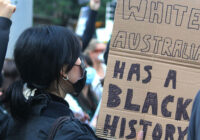In his latest attack on democratic values and principles, US President Donald Trump issued executive orders purging critical race theory (CRT) from diversity training in US federal agencies. According to the first order issued on September 4, “The divisive, false, and demeaning propaganda of the critical race theory movement is contrary to all we stand for as Americans and should have no place in the Federal government.” The order refers to diversity training that involves discussions of white privilege and the systemic forms of racism that are embedded within US history and institutions. According to the president’s most recent Executive Order on Combating Race and Sex Stereotyping issued on September 22, the so-called “destructive ideology” of white privilege is “grounded in misrepresentations of our country’s history and its role in the world.”
Should We Say Black or African American?
It is significant that these directives follow months of nationwide protests against racism in policing and the criminal justice system. The interdisciplinary field of critical race theory occupies an important position in the ideological basis of the Black Lives Matter movement. Activists protesting against systemic racism have made a point of acknowledging the many important critical race theorists and philosophers of the past and present who have advanced struggles for racial justice. The radical right has taken note of the relationship between CRT and Black Lives Matter. Breitbart News, for example, defines CRT as “the leftist, racist doctrine that forms the intellectual underpinnings of Black Lives Matter, Antifa, and other radical organizations currently engaged in unrest on America’s streets.”
Context and Reaction
The Trump administration’s censorship of CRT is an effort to counter the scholarly and intellectual critique that has been integral within advocacy and policy change to advance racial, sex and gender justice. It is the ability of CRT to name and challenge systemic racism that makes it confrontational to the ability of white and male privilege and power to remain unmarked, unnamed and unchallenged. In their response to Trump’s directive, the deans of all five California’s law schools stated that “CRT invites us to confront with unflinching honesty how race has operated in our history and our present, and to recognize the deep and ongoing operation of ‘structural racism,’ through which racial inequality is reproduced within our economic, political, and educational systems even without individual racist intent.”
Critical race theory has been put into practice through diversity education and training, showing how racism and sexism are not merely beliefs held and perpetuated by individuals, but that these and other forms of discrimination and exclusion are institutional and systemic. To eliminate CRT is to censor words and concepts like intersectionality, implicit bias, stereotyping, stigma, whiteness, white privilege and systemic and institutional racism, which effectively closes down processes of naming and unlearning unearned privileges associated with one’s race and gender.
CRT and cognate forms of diversity training have become important means of advancing the equal recognition and rights of those who have been historically excluded and victimized on the basis of their race, gender, disability or sexual orientation not only in the United States but in many parts of the world. In South Africa (the main context in which this author conducts research and teaching), CRT has been integral within efforts to name and challenge the persistence of white supremacy and white privilege in public and private sectors. Critical diversity studies has also emerged as a recognized academic field and area of professional development and training in South Africa.
While diversity training within US federal agencies is the immediate target of President Trump’s executive orders, scholars have raised alarm about implications for CRT as an area of scholarship. The Association of American University Professors issued a statement highlighting this concern, arguing that the order “denies and dismisses the efforts of experts across a wide variety of disciplines — such as law, history, social sciences, and humanities — to help us better understand and reckon with our legacy of slavery and persistent institutional racism.”
Right-Wing Hostility
Radical-right hostility toward the intellectual left is nothing new. In the United States, a right-wing intelligentsia has taken shape over the past 40 years, largely funded by conservative corporate philanthropic organizations. As Donna Nicol reports, conservative American critics have accused race and ethnic studies, as well as women’s studies, of being anti-Western and anti-American, arguing that these disciplines radicalize students toward “social anarchy” and undermined the American “free enterprise system.” The September 22 executive order, which accuses CRT of being a form of “propaganda” that amounts to “offensive and anti-American race and sex stereotyping and scapegoating,” grants this hostility new levels of power, influence and acceptability.
The recent orders that ban CRT in diversity training for US federal agencies is a warning that US-based critical academics are joining the ranks of critical scholars internationally who are facing repression by radical-right populist leaders. Trump’s blitz on critical race theory comes amidst a trend of growing attacks on academic freedom in many other parts of the world. Censorship of CRT also comes amidst the president’s refusal to condemn white supremacist organizations. His comments during a recent debate for these groups to “stand back and stand by” was lauded by the self-described “Western chauvinist” Proud Boys as a call to arms.
On the one hand, then, the Trump administration and other populist regimes’ agendas against the naming and interrogation of white supremacy may be indicative of their awareness that they are losing ground against anti-racist and anti-colonial movements for social justice and are feeling a threat to their hegemony. On the other hand, the banning of critical race theory in US federal agencies is indicative that academic freedom is the next democratic principle at stake and that critical scholars, especially those in publicly-funded institutions of higher learning, have good cause to be alarmed.
*[Fair Observer is a media partner of the Centre for Analysis of the Radical Right.]
The views expressed in this article are the author’s own and do not necessarily reflect Fair Observer’s editorial policy.
Support Fair Observer
We rely on your support for our independence, diversity and quality.
For more than 10 years, Fair Observer has been free, fair and independent. No billionaire owns us, no advertisers control us. We are a reader-supported nonprofit. Unlike many other publications, we keep our content free for readers regardless of where they live or whether they can afford to pay. We have no paywalls and no ads.
In the post-truth era of fake news, echo chambers and filter bubbles, we publish a plurality of perspectives from around the world. Anyone can publish with us, but everyone goes through a rigorous editorial process. So, you get fact-checked, well-reasoned content instead of noise.
We publish 2,500+ voices from 90+ countries. We also conduct education and training programs
on subjects ranging from digital media and journalism to writing and critical thinking. This
doesn’t come cheap. Servers, editors, trainers and web developers cost
money.
Please consider supporting us on a regular basis as a recurring donor or a
sustaining member.
Will you support FO’s journalism?
We rely on your support for our independence, diversity and quality.






